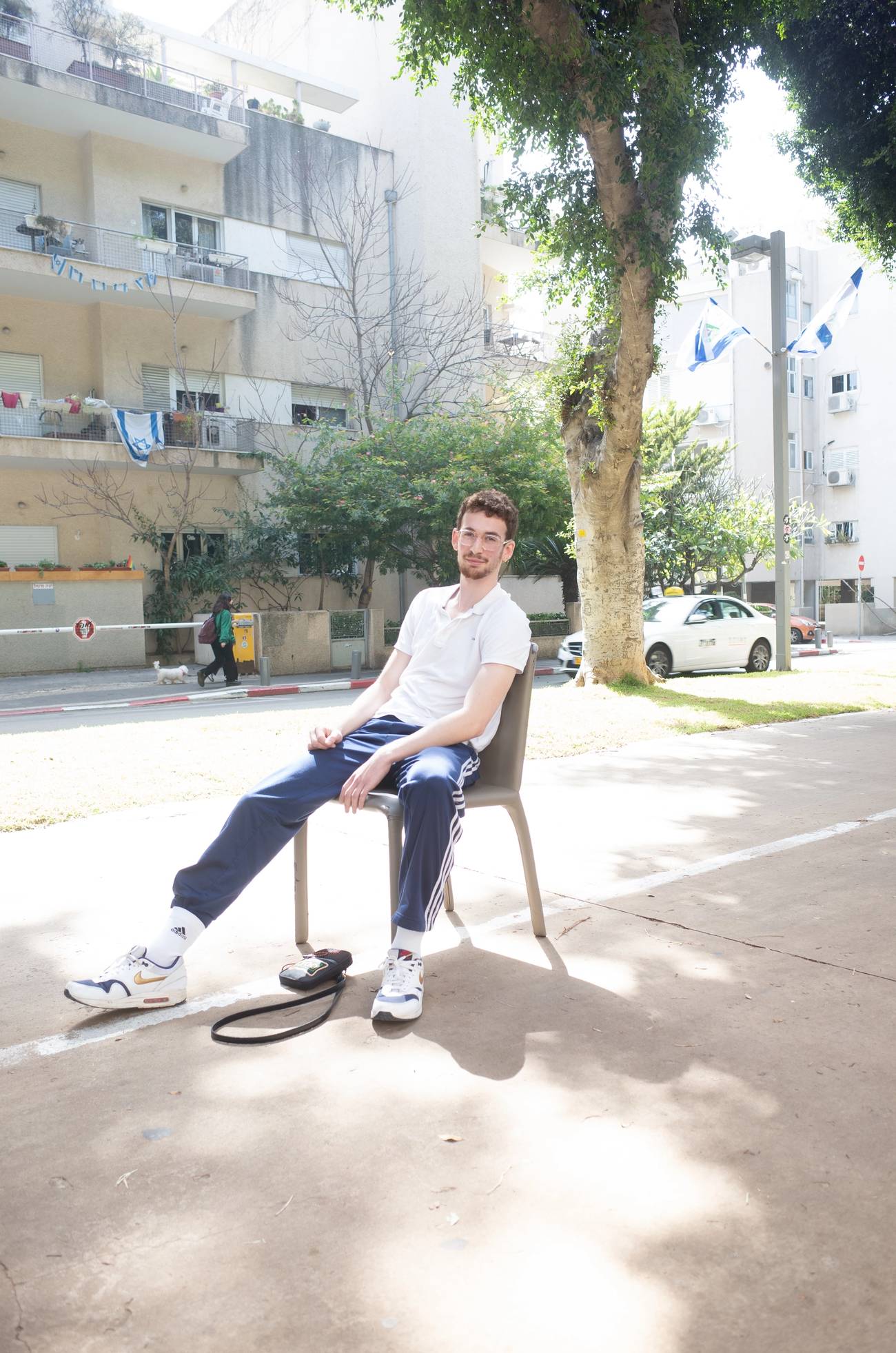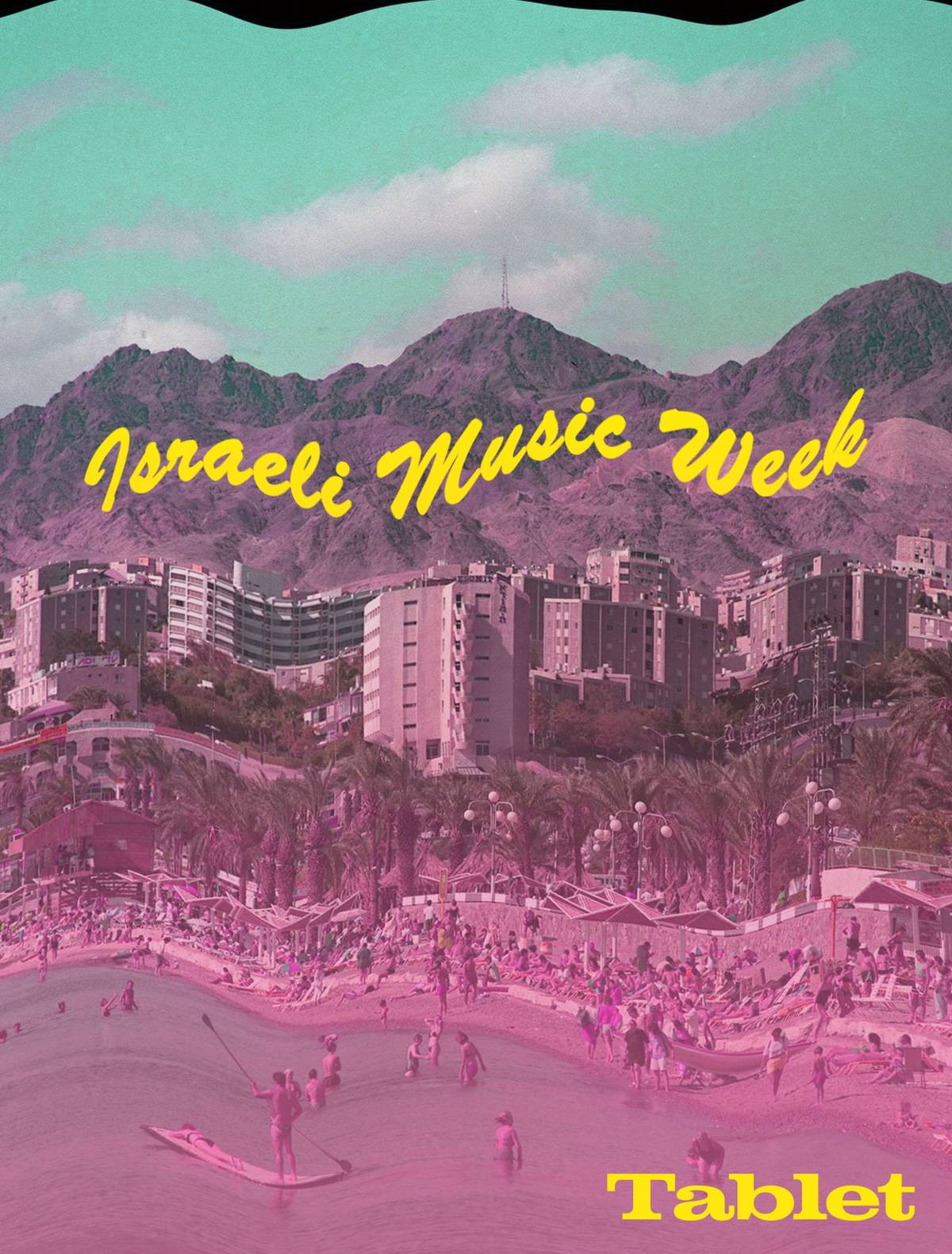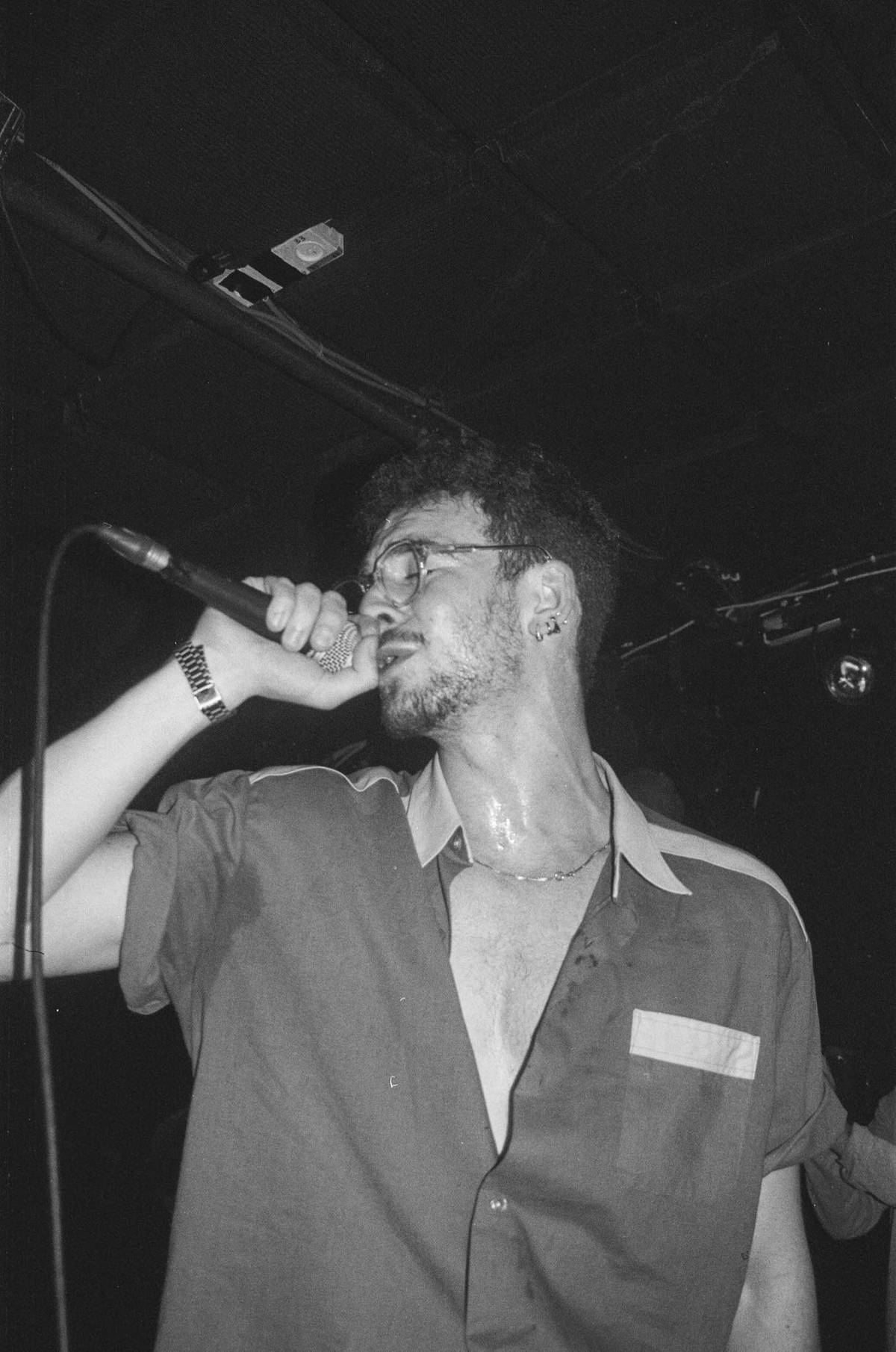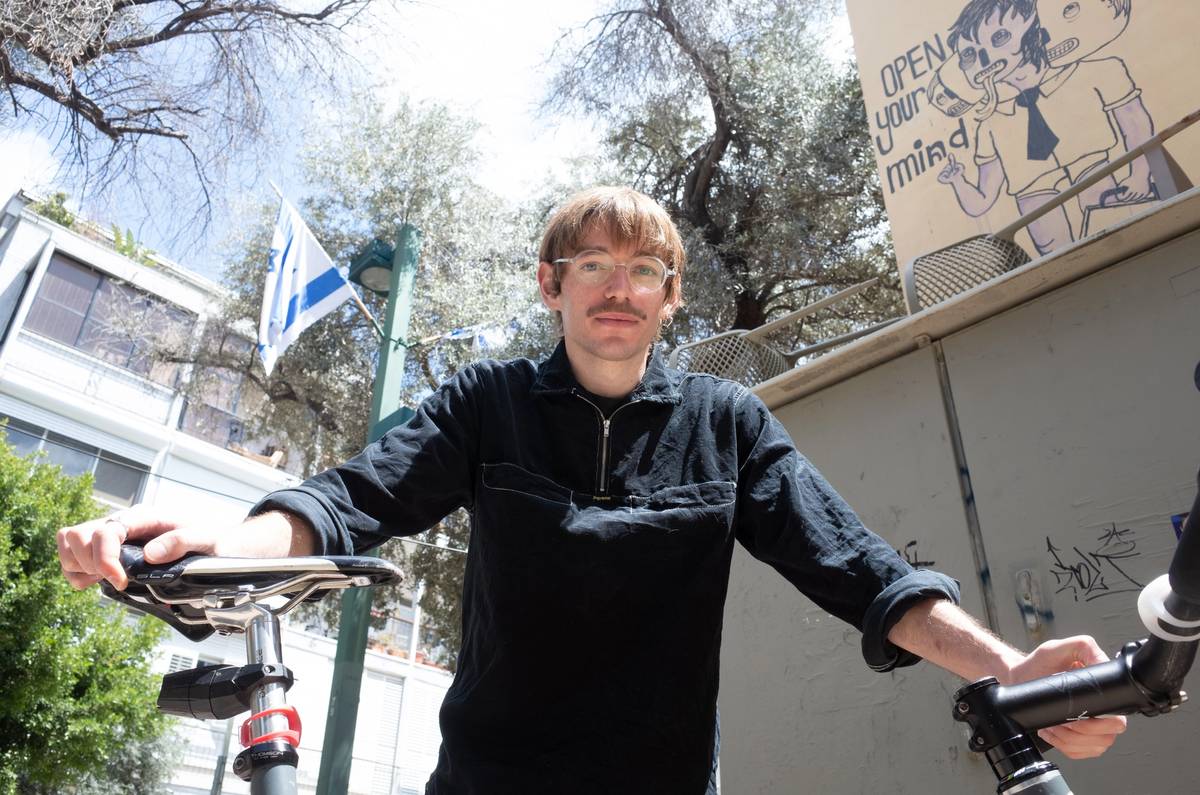Israeli Rap Is Ruining the Youth
Yotam ‘Vxodoo Daddy’ Rabino is a young Israeli rapper who skipped out on mandatory conscription and lived to spit the tale. He’s not the only one.




He was headbanging. He was amped. He was belting his heart out. Yotam Rabino, also known as Vxodoo Daddy, was center stage in the dimly lit Levontin 7 basement. Rabino is a bit geeky, a bit clumsy, and in an intense moment his thick-rimmed glasses went flying off his sweat-drenched babyface. The packed crowd below, filled with army-age teenagers who had traveled from across the country just to see him perform, went wild.
“This isn’t just a concert,” Rabino proudly announced. “It’s a cultural event.”
Rabino is a 21-year-old, up-and-coming rapper burning up the local scene. Like most in the crowd, he’s concerned with the Israel Defense Forces. But unlike them, he’s not serving in it. He’s spitting about it.
After his announcement, Rabino and his sidekick Evja—also sporting glasses along with a sleeveless tank, revealing heavily tatted arms—launched into their hilarious “(Not) an IDF Song,” a rap ballad that describes contemporary Israeli draft-dodging, not as a form of pacificism, but as a very generationally on-point combination of hedonism and legitimate mental illness, which is a central theme in their music.
“I wear whatever I want/You’re yellow (a brown-noser) and jealous,” Rabino rhymed. “Raise your hands, smile at the mirror/If I’m gonna be depressed, then at least not from the army.”
At the song’s peak, Rabino playfully replies to a faux question about why he didn’t sign up for the IDF-alternative National Service: “Ha ha ha ha, you made me laugh/It’s cause I don’t feel bad with myself!”

Rabino and Evja are not alone. Swissa. Atar Mayner. Dor 3. Noroz. Young Heffner. All young, talented Israeli rappers. All at the top of the local scene. All IDF rejects.
“I think it’s a good song,” joked Shy Tra, a shirtless, overweight 13-year-old lookalike who’d been bouncing around onstage, playing hype-man and performing songs like “White Fat Rich Boy.” He also didn’t enlist.
“Friends,” Shy Tra ominously added. “We’re not Jews. We’re not going to the army.”
“Stammmmmm.” He was “just kidding.” Except he wasn’t.
Rabino, Evja, and Shy Tra are not conventional rappers. Forget about Dre, or even the trap trend which has swept across Israel. This crew is doing something that I can best describe as “Tel Aviv hipster geek rap,” sort of Tyler the Creator meets Lil Dicky meets early Eminem sprinkled with a little bit of A Tribe Called Quest. It’s quirky. It’s comical. It’s lyrical. And it’s really freaking good.
“I can’t roll you a cigarette/I can make you chicken soup,” said the smooth, soft-spoken Evyatar “Evja” Freimann-Barbash, while performing their hit track “Popular.” He was poking fun at his straight-edged attitude—in Hebrew, that he’s sachi.
In the middle, Shy Tra Litman popped in; Tra, the reverse spelling of art, is his own addition. He’s the brashest of the crew, and for good reason: at the ripe old age of 19, he’s been a local celeb for a while now.
“I don’t have Grindr, I don’t have Tinder, I don’t have a body like a bodybuilder/I want a woman like Noa Kirel,” Israel’s pop princess, who he also makes clear he’s got no chance with. “I have a mentally ill girlfriend/That’s OK—I’m mentally ill, too!”
But the mastermind behind these tracks is Rabino himself. He makes the beats. He directs the videos. And his adorable lisp has hipsters all over the country swooning.
“Not gay, I just look it/Loser, that’s you/I don’t write lines about the girls that broke up with me, I don’t write songs about the girls that didn’t come.”
As I stood in the back of their show, it was obvious that they’d tapped into something. It wasn’t just that the crowd knew every word. It was that I did, too.
The fact that there can be real consequences to their attitude is part of what gives some of their lyrics their edge. Military service is absolutely central to the country’s ethos and to its citizens’ identities, and not enlisting could pose problems for their careers. Those who don’t serve often pay a high social price. For this reason, nonservice has historically been “shu-shu,” shoved under the rug. Celebrities who don’t serve often stay tight-lipped in fear of repercussions.

The rappers’ willingness to publicly flex about not enlisting—and that hundreds of army-age kids sang along—was revealing of something. I just didn’t know what. So I asked.
“If you’re trying to ask me if I have a problem with Vxodoo Daddy not enlisting, the answer is no!”
I had asked Yar, 21, serving in the prestigious 8200 unit, a question about the local rap scene. But he saw right through me. He’d come to the show from Jerusalem with his brother Nur and their friend Uri, both still in high school. My question spurred a debate about Rabino’s chances to make it big despite not enlisting. Yar thought he’d run into trouble. Nur disagreed.
“In contrast with musicians that don’t enlist and are ashamed, at least he sings about it,” he said.
“I don’t think he’ll have a problem,” said Uri, the only of the three who wouldn’t enlist. “It’s just not that important anymore.”
“Maybe we’re the difference,” Yar conceded. “Maybe the new generation is the difference between Vxodoo Daddy and those before him that didn’t enlist and were silent about it.”
Right before performing, I spoke with Rabino backstage, who was surrounded by a hipsterified hype crew. I kept it brief; I felt like I was back in high school. But one thing he said stuck with me.
“I don’t just take one angle,” Rabino explained. “My rap’s really complicated. That’s why it’s authentic.”
The history of Israel is one of mandatory military service—out of necessity, duty, and existential fears. The history of Israeli defiance of military service is less widely recognized, though it spans from pre-’48 pacifism to the 2014 letter from Yar’s unit.
Unsurprisingly, leftist politics have an undercurrent of refusals, and it’s also no secret that musicians are often of this persuasion. Just look to Hadag Nachash, perhaps Israel’s top rap group and also top protest band. But the 8200 letter and Hadag Nachash’s lyrics were written by those who served. While still taboo, critiquing the IDF from within is more culturally kosher than approaching from the outside.
But something seemed to shift in the ’90s, said Matti Friedman, frequent Tablet contributor and Israel social commentator. It was a decade marred by failed peace agreements, the death of the kibbutz movement, and a push toward an open market, a time when individualism began replacing the country’s founding collectivist ideals. In his docuseries A War Without a Name, Friedman analyzed the south Lebanon war, which dragged on throughout the ’90s, identifying the Four Mothers protest movement—in which parents of active IDF soldiers demanded a withdrawal from the conflict—as the beginning of the end. This movement, he told me, was also the beginning of something new: skepticism toward IDF tactics, and the necessary participation of one’s children in them.
“The Four Mothers movement was not saying our kids should be rappers,” Friedman said. “They were speaking as Israeli patriots. Their kids were in combat units. But the idea behind what they were saying is that the people in charge are wasting the lives of these kids. The government eventually kind of accepted that claim without really saying it by pulling out of Lebanon. So: If the mothers were right, what were we supposed to think about the army?”
Friedman also pointed to another change in public perception, one much more musically oriented: Aviv Geffen.
“Aviv Geffen was big,” said Friedman. “In the ’90s, it started to become more common to hear about people not enlisting. A key figure was Geffen, this huge pop star that hadn’t served.”
Geffen, Israel’s former bad boy rocker and current reality TV judge, was publicly lambasted for not serving. But the reason he didn’t go was legit. Kind of. Due to an intense 36-hour back surgery, the army sent him home, but only for 18 months. Geffen didn’t want to sit around, so he tried his luck auditioning for the IDF band. He failed, which hurt. When the army came back 18 months later, he told them he’d commit suicide if they made him enlist. They released him for good.
At the time, Geffen was writing his first album, It’s Only the Moonlight, where he sang openly about not enlisting (On “Last Night”: “They kicked me in front of everyone cause I wasn’t in the army/and what’s a sensitive heart compared to the security of the nation.”) And in interviews, he also spoke his mind (“Most people go to the army because they’re confused”).
Geffen’s comments were not received lightly. Media outlets were inundated with demands to cease playing his music. Geffen was personally threatened; some suggested exiling him. He tried apologizing, but the damage was done. In the eyes of many, he was tarred as a traitor. But for others, Geffen turned into a symbol of Israeli draft-dodging, a movement that was about to take off.
About 30 years have passed since Geffen’s original snafu. Unlike him, Rabino and company have yet to receive any substantial backlash for singing about not serving. All the rappers above received enlistment notices. None actually enlisted. And that’s not as strange as it once was.
Of all Israelis eligible for the draft, including Haredis—the original exemption— about one-third don’t enlist. Of the population at large, including Israeli Arabs, this number rises to above 50%. While personal military data is protected by law, it’s most likely that these rappers represent the growing trend of mental health exemptions. In 2020, nearly 12% of all potential draftees were found unfit for service, the majority due to mental health, representing a 4% rise in just two years. Some mental health exemptions reflect actual issues. But it’s also widely accepted that they’re easy to acquire and can be code for just-didn’t-wanna-do-it. Many young Israelis want to have fun, and for Tel Aviv hipsters anything associated with Israeli nationalism is uncool.
Within the rap world, some leaned on preexisting diagnoses. “I feared that if I’d enlist I’d be in a rough place that wouldn’t understand my panic attacks,” Swissa explained in an interview. Others, like Mayner and Noroz, were released midway through their service, another trend that has risen to about 15% of conscripts; “I told the Kaban that I’m not a fit,” raps Mayner in his mega-hit “Country of Thieves.” “The bastard laughed in my face!” In contrast to hypermasculine rap stigmas, it turns out that talking about seeing your shrink—the kaban is the military psychologist—can make for rich material. “The person not going to the army is me, tell the Kaban that Yotam isn’t real,” says Rabino on “(Not) an IDF Song”; Evja later chimes in that, “I showed the Kaban my tattoo, I sleep in peace cause I know it could always be worse.”
The IDF is well aware of these trends and is taking some questionable steps to quell them. One way is ensuring high-profile stars such as Kirel enlist, as she can set a public example. Sort of.
“The army has these crazy programs where they allow artists to pretend to serve while not serving,” said Friedman. “It’s part of them recognizing that people can get out if they want to. They used to assume that people would enlist. Now they can’t assume that. They have to cut deals with them.”
Kirel’s enlistment may change the hearts of some, but it certainly won’t single-handedly reverse these trends. “Israeli society is now more tolerant of people who decided for their own reasons not to serve,” said Friedman. “What you see now in rap, and in other parts of society, is people making a choice when they’re 18. They’re not saying, ‘the collective expects me to do it and I’m going to.’ They’re asking, ‘what’s best for me now? Is three years in the army going to be good for me or not?’”
Yet even if it’s more acceptable, it’s still not that acceptable. Consider that the rappers mentioned here not named Vxodoo Daddy, Evja, or Shy Tra may rap a line about the kaban, but they otherwise remain pretty silent. After all, we’re less than a decade removed from politicians effectively demanding cultural loyalty from artists.
So the fact that this crew is proudly singing an entire song about it is not simply naïve. It’s actually kind of brave.
I met Rabino and Evja separately on tree-lined Tel Aviv boulevards. Rabino had come straight from therapy (“Not good,” he responded when I asked how his session went. “I’ve been locked out of Instagram for two days.”) Evja’s sleek fixie stuck out among the Dizengoff strollers. Shy Tra said he didn’t want to meet; the others warned that he was notoriously hard to pin down.
Rabino and Evja were both born in Tel Aviv and met in high school when Rabino transferred from the “Democratic” magnet school to Ironi A, an art school exuding Tel Avivi stigmas: creative, hipster, pretentious. Back then, Rabino was brash, in part due to his pampered “Democratic” education. But he’s also incredibly smart and was probably just bored in class. At home, the autodidact would scour the internet. One day he stumbled across Eminem, and his entire world changed. Soon he dragged Evja in, who recalled Rabino playing him Mos Def’s “Mathematics” as the moment they became best friends. Rabino then signed up for production lessons with Michael Cohen, his idol and part of the rap duo Cohen@Mushon. (He mentioned that Cohen also hadn’t enlisted, but, of the previous generation, was “shu-shu” about it). After a year, he took an MF Doom track, grabbed Evja, started messing around with lyrics, and the rest is history.
Shy Tra’s background is different, and much more troubled. He’s been known for some time, having been profiled at age 14 for his graffiti and featured in public poetry slams. But his life began in the north of the country, where the liberal Tel Aviv bubble couldn’t protect him (“I was the fat weird kid. This follows me everywhere I’ve gone. It’s also how I’ve gotten attention,” he stated in a recent doc). At age 12, he moved to Tel Aviv to live with his alcoholic father and began wandering the streets, befriending artists decades older than him. He jumped between schools, including the “Democratic” school where he met Rabino before dropping out. The streets were calling. So was rap.

These three came of age amid major Israeli rap shifts. Hadag Nachash were aging; Cohen@Mushon were, too. And nationalistic right-wing rappers, such as Subliminal and The Shadow, are less influential among leftist Tel Avivi crowds. But hip-hop is their generation’s obsession, with the internet bringing artists like Tyler the Creator and Travis Scott to their fingertips. Predictably, the trap style has taken hold; Rabino and Evja pointed to Swissa as the one who imported it in 2015.
But Rabino wasn’t interested in trap. As the ringleader and beat-maker—Evja doesn’t rap without Rabino, though Shy Tra does—he wanted to do his own city-boy thing. Rabino’s not influenced by top 10 tracks; he’s memorizing Chaim Bialik poems and sampling Matti Caspi Brazilian cover songs. His current, admittedly ironic obsession is army band music.
And in an age when ideological army tunes have been replaced by ideological mainstream junk, these three are decidedly countercultural, personally and lyrically. Rabino’s anxious, high-strung, witty, and playful, poking fun at the rap scene and at instant celebrity: on “Hey,” “Swissa’s not picking up, they said he’s busy/I don’t have any followers, I’m suing Facebook” ... “Cohen didn’t pick up, he saw my message/I don’t have any followers, I’m suing the state.”
Evja, who just began his B.A. in physics-mathematics at Tel Aviv University, is sensitive, bright, and embarrassed by the limelight. When he was younger, “sometimes I wanted the earth to swallow me whole,” he states. He puts this well in his track “Hey,” “Don’t care about being famous/Long equations, dreams about girls/I wish they were about sex and not about feelings.”
Shy Tra, well, his lyrics speak for themselves: “Once I was fat/Today I’m still fat” and “I have a very big body/and a really small penis” stood out during the show. Others are disturbing, even darkly poetic: “I’m screaming in my room, and my dad doesn’t care/He doesn’t care, I don’t care/and I killed my towel and I raped my mom/and I packed my towel and I killed my mom/and I raped my sister and a bird I ate/and I puked up everything and I cried for an hour,” on “I Cried for an Hour.” Light stuff.
Shy Tra is also the most obvious army reject; any self-respecting kaban would glance at his lyrics and release him on the spot. But the “official” exemption, I thought, was because he’s overweight; the rapper Lukatch was released from army service via that route. “Shai’s fat, but he’s not that fat,” said Rabino. “He came with his personal history, and they just said, ‘Bye. We don’t want you here.’”
Rabino was next to get the boot. He’s too sensitive, too intellectually combative, and deals poorly with authority. Less than 10 minutes into our conversation, he preemptively brought up the subject. And while I’d previously thought these rappers were getting out to party and get high and chase girls, it wasn’t hedonism that drove him.
He’d considered becoming a pacifist, a designation that’s notoriously difficult to obtain. But after a few months, he realized he’s not against the army. He’s against him doing the army.
“The army is an important social system. How, how much and why, I can’t say. I’m simply not qualified to talk about it,” adding that, “I can talk about the occupation, violence, etc. But none of it really matters. In the end, what mattered is that I didn’t want to do it.”
Evja was the most likely to enlist, spending years trying out for Atuda, a prestigious 10-year track akin to an Ivy League education that leads into desirable high-tech careers. But Evja decided not to make such a heavy decision at such a young age.
“I suddenly realized it was the stupidest thing I could do,” said Evja. “I wasn’t doing it because I really wanted to. I was doing it out of fear of being judged—from others, family, generally—cause it’s what you’re supposed to do.”
What’s interesting about the explanations the artists gave for not serving is that they weren’t anti-nationalistic. Well, at least not Rabino and Evja. (“I’m a leftist, Tel Avivi hipster that’s ashamed of our flag ... I feel that I’m not part of anything, not the state, not Israeliness,” Shy Tra stated in an interview). “I feel Israeli. I feel Tel Avivi,” said Evja. “The country is falling apart, and I want to turn it into something better.”
Rabino feels similarly. Before COVID, he had worked at a law firm that helped Holocaust survivors and asylum seekers pro bono. He was adamant that these acts make him a good citizen, too, rapping that: “You don’t need the army just to give back/I don’t need you just to sleep.”
Ultimately, all three were released on mental health grounds. Rabino was certain that the other Tel Aviv rappers were, too. Everyone I talked to was. Rabino also added that “it doesn’t matter what they say. At the end of the day, it’s because they didn’t want to.” And it irked him that no one raps about this.
Evja was more understanding: “It’s just easier not to talk about. I felt like I always had to apologize for not enlisting. So it was hard for me to release [‘(Not) an IDF Song’].”
But he added that: “If someone gets mad, I just say: Listen to the words. I don’t say a thing about you. I talk only about myself. Like in all my songs. Cause it’s the only thing I know. At least roughly. Not 100%.” Rabino emphasized this point in the song’s chorus: “This isn’t an IDF song, you’re imagining things/I’m not in the IDF, you’re humming along.”
Elie Bleier is a producer at Israel Story, a writer, and a former Tablet Journalism Fellow.